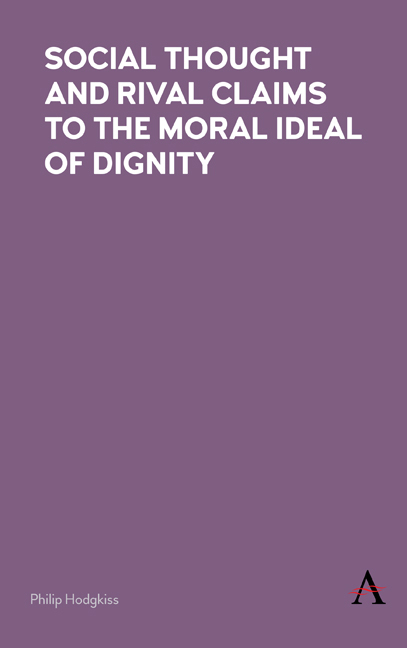Book contents
- Frontmatter
- Contents
- Preface and Note on Text Structure
- Acknowledgements
- Chapter One Introduction: The Distinction of Dignity
- Chapter Two Dignity, Freedom and Reason: From Ancient Greece to Early Modernity
- Chapter Three The Sense of Dignity in Moral Philosophy: From the Ethical Intuitionists to the Irrationalists
- Chapter Four Marx's Critique of Morality: Natural Law, the State and Citizenship
- Chapter Five Classical Sociology's Regard for Human Dignity
- Chapter Six The Human Face of Dignity Reflected in Phenomenology and Existentialism
- Chapter Seven A Fresh Term for Dignity: Attending the Frankfurt School (Both ‘Old’ and ‘Young’)
- Chapter Eight Notes Sampling Research and Practice: Making Dignity Work; Making Dignity Care
- Chapter Nine The Slighting of Dignity: The Critic's Charter
- Chapter Ten Conclusion: After the Recognition of Dignity
- Notes
- Bibliography
- Index
Chapter Two - Dignity, Freedom and Reason: From Ancient Greece to Early Modernity
Published online by Cambridge University Press: 21 June 2018
- Frontmatter
- Contents
- Preface and Note on Text Structure
- Acknowledgements
- Chapter One Introduction: The Distinction of Dignity
- Chapter Two Dignity, Freedom and Reason: From Ancient Greece to Early Modernity
- Chapter Three The Sense of Dignity in Moral Philosophy: From the Ethical Intuitionists to the Irrationalists
- Chapter Four Marx's Critique of Morality: Natural Law, the State and Citizenship
- Chapter Five Classical Sociology's Regard for Human Dignity
- Chapter Six The Human Face of Dignity Reflected in Phenomenology and Existentialism
- Chapter Seven A Fresh Term for Dignity: Attending the Frankfurt School (Both ‘Old’ and ‘Young’)
- Chapter Eight Notes Sampling Research and Practice: Making Dignity Work; Making Dignity Care
- Chapter Nine The Slighting of Dignity: The Critic's Charter
- Chapter Ten Conclusion: After the Recognition of Dignity
- Notes
- Bibliography
- Index
Summary
As I descended, I gazed back, and the lofty summit of the mountain seemed to me scarcely a cubit high, compared with the sublime dignity of man. (Petrarch, cited in Sale 1992, 77)
Though the universe were to destroy him, man would be more noble than his destroyer, for he would know that he was dying, while the universe would know nothing of its achievement. Thus all our dignity consists in the thinking principle. This and not space and duration is what elevates us. Let us labour then to think aright; here is the foundation of morals. (Pascal 1995, 5)
Dignity as the Consummate Act of Reason
The Ancient Greek view from Socrates through Plato and Aristotle (best represented in The Nicomachean Ethics, 1980) is that the way we live our lives is an issue for every one of us, as is the question of what might constitute the good life. The Hellenistic schools of Stoicism and Epicureanism could not only speculate on what might constitute ‘the good’, but they were sufficiently independently minded to conceive of it in isolation from the prevailing social order: they were not held fast in the grip of custom. Whatever differences a fine- grained analysis might reveal in the relative positions adopted, what they had in common was a concern with the future and themselves – or someone very much like themselves – inhabiting it. Yet, strangely, while the exact location of mind tended to elude them, they had very definite views about the most desirable state of mind. Both Stoicism and Epicureanism stressed ataraxia, meaning freedom from mental disturbance or a state of being untroubled; peace of mind was the measure of happiness, not physical or emotional pleasure or enjoyment. It was in how to achieve it that inherent differences in emphasis became apparent. Happiness was no longer to be the key to dignity, but, rather, the dignified life became the door to happiness that, for the Stoics, betokened pride in being human. While the Sophists had set nature (physis) against human law (nomos) as a constant value in the face of transitory human life and institutions, for the Stoics physis was no longer to be placed in opposition to nomos, as it was to become a synonym for it.
- Type
- Chapter
- Information
- Publisher: Anthem PressPrint publication year: 2018



